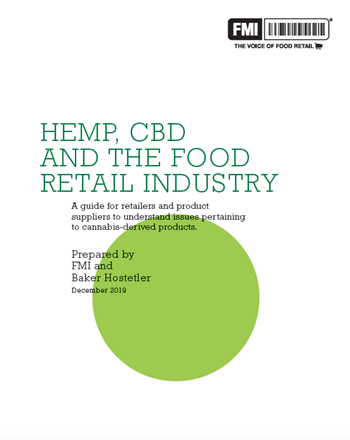By: Stephanie Harris, Chief Regulatory Officer, FMI
 Since Congress passed the 2018 Farm Bill, there has been widespread confusion in the marketplace concerning hemp-derived products, especially those containing cannabidoil (CBD). Although the Farm Bill took the early steps toward legalizing hemp and hemp-derivatives, the Food and Drug Administration (FDA) still prohibits the addition of CBD to foods or dietary supplements, while a patchwork of state laws have emerged. The door appears to be open for topical products containing CBD, however, companies should be cautious making certain health claims or using other marketing tactics.
Since Congress passed the 2018 Farm Bill, there has been widespread confusion in the marketplace concerning hemp-derived products, especially those containing cannabidoil (CBD). Although the Farm Bill took the early steps toward legalizing hemp and hemp-derivatives, the Food and Drug Administration (FDA) still prohibits the addition of CBD to foods or dietary supplements, while a patchwork of state laws have emerged. The door appears to be open for topical products containing CBD, however, companies should be cautious making certain health claims or using other marketing tactics.
How can your company navigate the emerging and changing regulatory framework while addressing the rising consumer demand for CBD products? Carefully. FMI has compiled a resource guide to help our member companies account for the many federal and state policies currently in place and to anticipate the unpredictable and changing regulatory landscape in the months to come.
Our guide breaks down the legal status of CBD, while also providing some general information on what CBD is and how it can be used. This guidance is intended to serve as a resource for those in the food retail industry looking to better understand CBD products.
Here are a few areas that the guide addresses:
- Terms frequently used by industry, including some which lack a formal definition from the FDA or any other agency.
- An overview of Hemp, CBD, and the food retail industry.
- CBD’s status under federal law.
- CBD’s status under state law.
- Product claims.


 Industry Topics address your specific area of expertise with resources, reports, events and more.
Industry Topics address your specific area of expertise with resources, reports, events and more.
 Our Research covers consumer behavior and retail operation benchmarks so you can make informed business decisions.
Our Research covers consumer behavior and retail operation benchmarks so you can make informed business decisions.
 Events and Education including online and in-person help you advance your food retail career.
Events and Education including online and in-person help you advance your food retail career.
 Food Safety training, resources and guidance that help you create a company food safety culture.
Food Safety training, resources and guidance that help you create a company food safety culture.
 Government Affairs work — federal and state — on the latest food industry policy, regulatory and legislative issues.
Government Affairs work — federal and state — on the latest food industry policy, regulatory and legislative issues.
 Get Involved. From industry awards to newsletters and committees, these resources help you take advantage of your membership.
Get Involved. From industry awards to newsletters and committees, these resources help you take advantage of your membership.
 Best practices, guidance documents, infographics, signage and more for the food industry on the COVID-19 pandemic.
Best practices, guidance documents, infographics, signage and more for the food industry on the COVID-19 pandemic.
